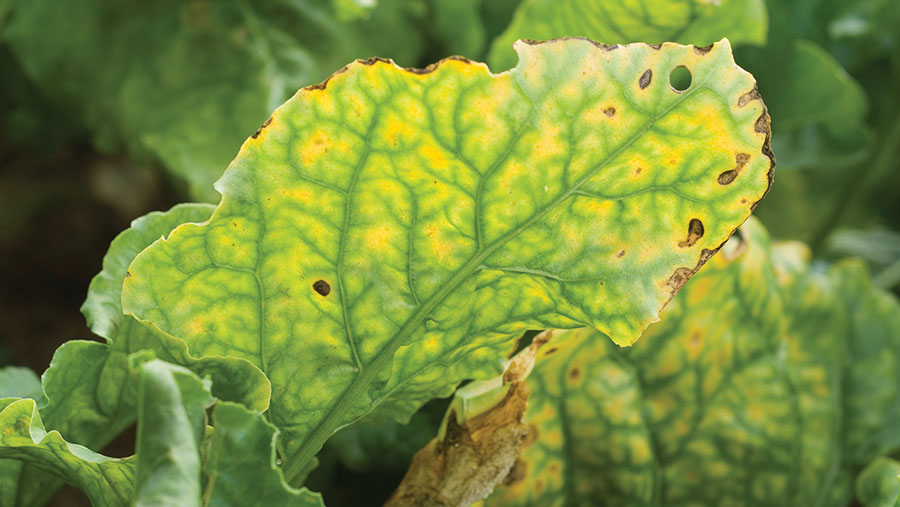Defra approves neonics seed treatment for sugar beet crops
 © Blackthorn Arable
© Blackthorn Arable Defra has granted the English sugar beet industry an emergency authorisation to use neonicotinoid-treated seed due to the risk posed by virus yellows.
For the 2022 sugar beet planting season, growers will be allowed to use seed treated with Syngenta’s neonicotinoid Cruiser SB (thiamethoxam) to stave off the threat of virus yellows, which is spread mainly by aphids and can result in yield losses of up to 50%.
Announcing the decision, Defra secretary George Eustice said he had considered the joint application from NFU and British Sugar and decided the emergency authorisation should be granted subject to strict conditions.
See also: Beet growers ‘devastated’ by tariff-free sugar cane extension
This includes a prohibition on any flowering crop being planted in the same field where the product has been used within 32 months to reduce the risk to bees.
There will also be an initial threshold for use, meaning that seed treatment will only be used if the predicted level of virus is at or above 19% of the national crop according to independent modelling.
If the virus threshold is not met, the neonicotinoid-treated seed will not be used.
The maximum amount of treatment approved for use is 6% of the quantity of active substance applied on a range of crops in 2016, before neonicotinoids were prohibited.
Total ban
The European Union agreed a ban on all outdoor uses of neonicotinoids in April 2018 after scientists linked their use to harming bee health.
Since the ban, sugar beet growers have suffered serious yield losses as foliar sprays and organic treatments are not as effective in controlling viruses. In 2020, sugar beet yields were down 25% on previous years.
Twelve large EU sugar-producing countries have granted similar emergency authorisations in the past three years for neonicotinoid seed treatments to be used on sugar beet. In France, the ban on the use of neonicotinoid-treated seed on beet crops has been suspended until 2023.
Some 63% of the UK’s sugar comes from domestic production of sugar beet, which Defra said could be at risk if a significant amount of the national crop is infected.
But the use of Cruiser SB will provide protection against virus yellows “while the industry develops alternative solutions”.
Defra said the decision “had not been taken lightly” and was based on “robust scientific assessment”. It applies only to beet growers in England, as agriculture is a devolved policy area.
‘We evaluate the risks very carefully and only grant temporary emergency authorisations for restricted pesticides in special circumstances when strict requirements are met,” said a spokesperson.
“Last year the threshold was not met, so the authorisation was never exercised. Strict criteria remain in place, meaning this authorisation will only be used if necessary.”
Industry relief
The NFU and sugar beet growers welcomed the decision.
NFU Sugar board chairman Michael Sly said: “I am relieved that our emergency application has been granted. Any seed treatment will only be used if an independent, scientific threshold is met, which forecasts the severity of pest pressure.
“Virus yellows disease can cause huge devastation to a sugar beet crop, and only last year we saw crop losses of up to 80%.
“If pest pressure is that severe again, this authorisation will prove invaluable in fighting the disease and ensuring Britain’s sugar beet growers continue to have viable farm businesses.
“The sector continues to work hard to find viable, long-term solutions to this disease as soon as possible.”
Green groups upset
However, environmental charities said it was “shameful” and a “betrayal”.
Sandra Bell, a campaigner at Friends of the Earth, said: “Allowing a bee-harming pesticide back into our fields is totally at odds with ministers’ so-called green ambitions, not to mention directly against the recommendation of their own scientists.
“This decision comes just two months after the government enshrined in law a target to halt species loss by 2030.”

